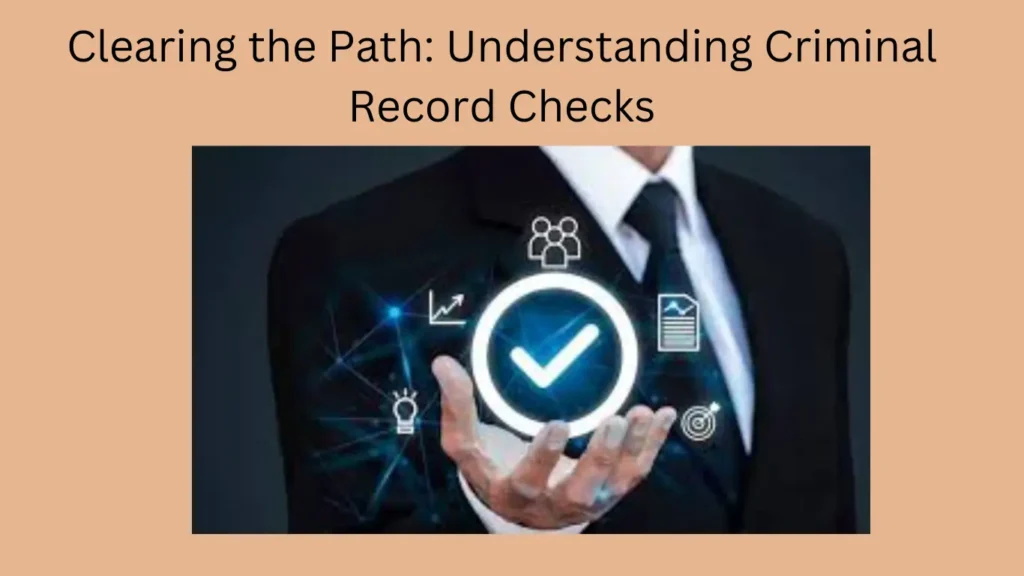Introduction
Criminal record checks are an essential part of the background verification process, ensuring the safety and integrity of workplaces, communities, and personal relationships. This guide aims to provide a comprehensive understanding of criminal record checks, their importance, how they are conducted, and best practices for using them effectively.
Why Are Criminal Record Checks Important?
1. Ensuring Safety: Criminal record checks help identify individuals with a history of criminal behavior, reducing the risk of harm to others in the workplace, educational institutions, or residential communities.
2. Protecting Reputation: Organizations that conduct thorough criminal record checks demonstrate a commitment to safety and integrity, which can enhance their reputation and build trust with clients, customers, and stakeholders.
3. Legal Compliance: Many industries and regulatory bodies require criminal record checks to comply with legal and regulatory standards, ensuring that organizations meet their legal obligations.
4. Making Informed Decisions: Criminal record checks provide valuable information that helps employers, landlords, and other decision-makers make informed choices about who they hire, lease to, or engage with.
Types of Criminal Record Checks
1. Basic Criminal Record Check: This check reveals any unspent convictions on an individual’s record. It is often used for roles that do not require access to vulnerable populations or sensitive information.
2. Standard Criminal Record Check: A standard check includes both spent and unspent convictions, as well as cautions, reprimands, and warnings. It is suitable for positions of trust, such as teaching or financial services.
3. Enhanced Criminal Record Check: An enhanced check provides a more detailed look into an individual’s criminal history, including any information held by local police that may be relevant to the role. It is required for roles involving work with children or vulnerable adults.
4. International Criminal Record Check: For individuals who have lived or worked abroad, an international criminal record check may be necessary to ensure there are no convictions in other countries.
How to Conduct Criminal Record Checks
1. Obtain Consent: Before conducting a criminal record check, obtain written consent from the individual. This is a legal requirement and ensures transparency in the process.
2. Use Reputable Services: Partner with accredited and reputable background check providers to ensure the accuracy and reliability of the information obtained.
3. Verify Identity: Ensure that the individual’s identity is accurately verified using government-issued documents to avoid errors and misidentifications.
4. Understand Legal Requirements: Familiarize yourself with the legal requirements for criminal record checks in your jurisdiction, including data protection laws and the rights of the individual.
5. Assess the Information: Evaluate the information obtained from the criminal record check in the context of the role or decision being made. Consider the nature and relevance of any convictions or warnings.
Best Practices for Using Criminal Record Checks
1. Develop a Clear Policy: Create a clear policy outlining when and how criminal record checks will be conducted, and ensure that it is communicated to all stakeholders.
2. Apply Consistently: Apply criminal record checks consistently across similar roles to ensure fairness and avoid discrimination claims.
3. Provide Opportunities for Explanation: Give individuals the opportunity to explain any convictions or warnings revealed in the check, and consider the context and time elapsed since the offense.
4. Keep Information Confidential: Handle all information obtained from criminal record checks confidentially and store it securely to protect the privacy of the individual.
5. Regularly Review Practices: Regularly review and update your criminal record check practices to ensure compliance with changing laws and best practices.
Conclusion
Criminal record checks are a vital tool for ensuring safety, protecting reputations, and making informed decisions. By understanding the different types of checks, how to conduct them, and best practices for using them, organizations and individuals can clear the path to safer, more trustworthy environments.
For further Inquires Contact Us
FAQs
1. What is a criminal record check?
- A criminal record check is a background check that reveals an individual’s criminal history, including convictions, cautions, reprimands, and warnings.
2. Why do employers conduct criminal record checks?
- Employers conduct criminal record checks to ensure the safety of their workplace, protect their reputation, and comply with legal and regulatory requirements.
3. How do I get consent for a criminal record check?
- Obtain written consent from the individual before conducting a criminal record check, ensuring they understand the scope and purpose of the check.
4. What information is included in an enhanced criminal record check?
- An enhanced criminal record check includes spent and unspent convictions, cautions, reprimands, warnings, and any relevant information held by local police.
5. How can I ensure the privacy of criminal record check information?
- Handle information confidentially, store it securely, and ensure it is only accessible to authorized personnel, complying with data protection regulations.
